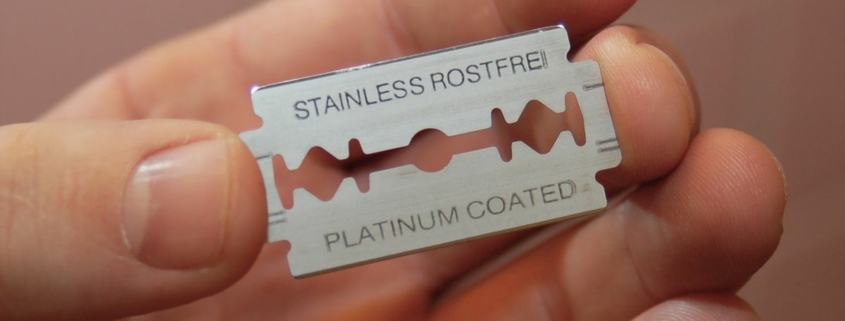I Cut Myself: Is that Really a Problem?

Image courtesy of Wikimedia Commons
“Why do I cut myself?” is not a question most people would think of asking themselves, but it is a reality for countless individuals, the vast majority of whom are in their youth. Self-injury is more common than most of us realize.
Self-harm (which occurs when someone cuts, burns, or otherwise hurts him or herself— the condition is clinically known as non-suicidal self-injury (NSSI)). There is no intention of being suicidal, and the condition involves quite a bit of secrecy, shame, anxiety, and often lying. It may involve mental illness, and is also a very isolating activity, making it more difficult for someone to admit to harming himself or herself.
A common misperception is that young, white females engage the most in NSSI, but studies have shown that at least 35 percent and possibly as many as half of the self-injurers are male. Research indicates that about 15 percent of college students engaged in NSSI at least once and that about 17 percent of adolescents had engaged in NSSI at least once. Reported self-injury is much less common in adults (about a five percent lifetime rate) and in most children. Note that about 1.3 percent of children aged 5 to 10 self-harm, and that rate spikes significantly if the child has a diagnosed anxiety disorder or chronic mental distress.
More often than not, “cutters” work overtime to keep their self-harm in secrecy (covering up cuts, burns, scars, marks, etc.) because they feel ashamed about their covert self-harming activities. Interestingly, research has shown that those that feel higher levels of shame are more than likely to harm themselves.
Why all the secrecy? Frequently, one of the secrets that lead to self-harm is the underlying reason the individual is cutting him or herself, to begin with. The lying and covering up may be an attempt to hide some severe trauma (such as sexual abuse) that the cutter isn’t willing to discuss. Sexual abuse, by the way, makes someone far more likely to self-harm.
Someone who self-harms may continue this lifestyle of secrecy driven by acute stress, guilt, shame, and self-blame (esp. in the case of having been sexually abused). A cutter may feel that he or she needs to be “punished” for being responsible for something so shameful, which can lead to a cycle of self-harm, shame, self-blaming, more self-harm, etc.
Other cutters may feel shame about the self-harming in and of itself. They may often feel “weak” or “foolish” because of their self-harm habits, and that therefore, they feel compelled to keep it all a secret. They may worry about being judged for their self-harming behaviors, about being “looked down” upon, or that others will be shocked and repulsed by their self-harming tendencies.
Whatever the reason for secrecy, this stress-fueled cycle of shame pushes an individual into an isolated world where “no one can know about me cutting myself.”
Other reasons for self-harm include:
- To distract oneself, focus attention elsewhere, or get control again of one’s mind when being inundated with unavoidable, intrusive, and unsettling thoughts and/or feelings.
- To “feel something” when day-to-day life becomes associated with a sense of emotional dissociation and “numbness.”
- To release tension associated with powerful emotions or overwhelming thoughts.
- To poignantly communicate or express oneself regarding strong emotions that one feels powerless to articulate.
- To feel a certain kind of passing and intense feeling of euphoria that can be experienced immediately after self-harming.
Most people who harm themselves never have any intention of significantly injuring themselves to the point of being dangerous. Yet self-harm, cutting in particular, poses a lot of health risks, such as serious infection, blood loss, other complications, and even death. Admitting that you harm yourself is nothing to feel shame about. If you are cutting yourself, you’re likely coping with life stresses in the best way that you know how.
Know that by not keeping your self-harm a secret, by confiding in someone you trust (though that may take quite a bit of courage), can help you figure out better ways of dealing with your problems, and the next natural step will be to get professional help if necessary, which will lead to you stopping to hurt yourself. You will feel less isolated, less guilt, and less shame when you realize that you really do have people who care about you and support you regardless of how you feel about yourself.
Do you secretly cut yourself? Are you afraid of what others might think if they were to find out? We’d love to hear from you, even just to talk! If you or someone you love need to talk to someone about self-harm or feelings of being overwhelmed, we want to help. Consider reaching out to our expert team at Solara Mental Health at 844-600-9747.





Leave a Reply
Want to join the discussion?Feel free to contribute!